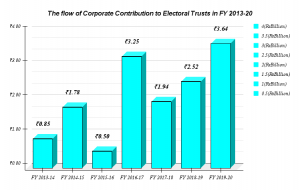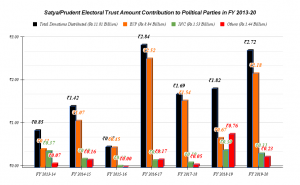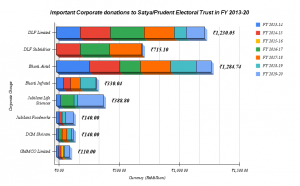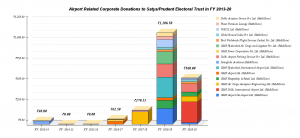
The corporate-government nexus in Indian politics: An analysis of corporate backed electoral trusts
Jayant Pankaj has an Integrated Masters in Political Science in 2021 from the University of Hyderabad and has worked on the role of corporate financing in Indian politics.
Shivam Mogha is a PhD candidate in IIT Bombay, where he is researching the role of corporate firms in the history of farmer’s movement. He is a co-editor of Trolley Times. Twitter: @ShivamJNU
In this essay Jayant Pankaj and Shivam Mogha explore the role of big money in Indian politics. Corporate funding in Indian electoral politics has shot up in the last few election cycles, Pankaj and Mogha examine how that affects policy decisions, election campaigning and whose interests are ultimately being served in this democracy.
While referring to the politics of Mahatma Gandhi and Muhammad Ali Jinnah, Bhimrao Ambedkar once said: “In establishing their supremacy they have taken the aid of big businesses and money magnates. For the first time in our country, money is taking the field as an organized player.” (Part III, p. 227) Ambedkar made this statement in 1943 and today it is truer than ever. The prevalence of corporate funding in India’s politics reveals the disproportionate influence that the corporate classes wield over the democratically elected government.
In India, the involvement of corporate houses in financing political parties has been on the rise for the past two decades. A report by the Observer Research Foundation shows that in Fiscal Year (FY) 2004-05, corporate groups donated Rs. 621.4 million; in FY 2009-10 donations reached approximately Rs. 1.6 billion and then rose to Rs. 5.7 billion in FY 2014-15. Over a period of ten years, the amount of corporate money in politics has increased almost tenfold.
In early February 2017, the Government of India announced the Finance Bill 2017 where it introduced a new mechanism of political funding: the electoral bond scheme, an interest-free bearer instrument (like a promissory note) that can be purchased from any of the State Bank of India (SBI) within a specific period in every quarter of the fiscal year.
As mentioned in the notification, the scheme allows individuals and domestic companies to purchase these bonds in monetary denominations of Rs. 1,000, Rs. 10,000, Rs. 100,000, Rs. 1 million and Rs. 10 million. The buyers can then donate the bonds to any political party and the parties have to redeem them within 15 days. The beneficiary is not liable to reveal the names of the entity that donated the bonds.
According to the latest Association for Democratic Reforms (ADR) report, in FY 2017-18 and FY 2019-20, recognized national political parties redeemed electoral bonds worth Rs. 62 billion, 67.98 percent of them (around Rs. 42 billion) by the Bhartiya Janata Party (BJP). In this period, 92.3 percent of the bonds have been redeemed in the denomination of ten million rupees, which to ADR it indicates that it is corporate money.
Transparency rights activists vehemently opposed this scheme for the clause of anonymity that protects the donors. The Reserve Bank of India (RBI) and the Election Commission of India (ECI) also warned the Minister of Finance of the drawbacks of this scheme. The objections were overruled and the Bill was passed in the Lok Sabha as a part of Finance Bill in 2017.
The electoral bond scheme allows political parties to accept funds from dubious entities that may act against public interest. In the past seven fiscal years (2013-20), corporate backed electoral trusts were mostly donated to the ruling BJP party.


Source: ADR data.
The BJP government’s legalization of opaque political funding is not new to Indian politics. The seeds were sown in 2013, when the Indian National Congress (INC) led-United Progressive Alliance (UPA) instituted the electoral trust scheme supposedly to bring transparency into political funding, but was instead widely used to dodge disclosure. This trust scheme is an adaptation of the German model, where different corporate houses contribute funds to electoral trusts on a non-partisan basis. In India, Tata had set up their electoral trust in 1996, while other notable business houses such as Aditya Birla Group and Bharti Group adopted this model gradually.
Several electoral trusts contributed to political parties on multiple instances before. The Central Board of Direct Taxes (CBDT) in 2013 notified an electoral trust scheme where any corporate house could contribute 7.5 percent of their net profit to political parties through any electoral trust. This scheme helped business houses remain anonymous as they could simply donate to electoral trusts without being explicitly linked to political parties. These trusts would in turn donate the money to the parties thus acting as legal buffers. Though donation details (the name of the donor and the trust it donates to) are registered with the ECI, no direct connection can be made between them. When media outlets asked corporate houses if they had any links to electoral trusts, they retained their right to remain silent.
Even though business houses have donated funds directly to political parties, electoral trust has gradually become the most common means of contribution as shown in Figure I. As of 2021, there are 19 registered electoral trusts backed by elite corporate houses such as Tata’s Progressive Electoral Trust, Reliance’s People’s Electoral Trust and Vedanta’s Janhit Electoral Trust.
Bharti Groups backed Prudent Electoral Trust, earlier known as Satya Electoral Trust, stands out for donating the largest amount to different political parties including the BJP. Figure II shows that, from 2013 to 2020, the BJP has continually received large donations from Prudent Electoral Trust (around Rs. 8.84 billion out of the total distribution of Rs. 11.81 billion). ADR reports show that Prudent Electoral Trust is not the only trust that heavily donated to the BJP, A B General Electoral Trust donated over Rs. 490 million to the BJP in FYs 2017-20 and Tata-controlled Progressive Electoral Trust topped the contributors list with a donation to the BJP of Rs. 3.56 billion in FY 2018-19.
The question of why corporate backed electoral trusts are paying such amounts to one particular party remains. Large capital owning companies have always paid hefty sums to the ruling party: generally, the corporate class wants to remain in favor of the ruling regime. Stanley A. Kochanek’s study shows that, though Indira Gandhi’s Congress government officially banned corporate funding in politics, corporations would ensure that large sums of money in briefcases would reach the appropriate political parties. Kochanek describes the 1970s as the “briefcase era” politics. This was also a way to launder black money. The ruling regime, naturally, got their fair share of briefcases too.
Today, favors extended by politicians to corporates in exchange for liquid capital have become institutionalized through the electoral bond scheme. The lack of any legal cap on the amount of money that can be transferred allows for all kinds of anonymous donations to politicians. This system has significant political implications.
In the early days of Independence, Indian society was largely traditional. According to scholars Aseema Sinha and Andrew Wyatt, with the 1990s economic liberalization, a middle class started to emerge along with public-private-partnerships (PPPs) that highly benefited business groups. Simultaneously, as words like “development” entered the public discourse, the earlier cynicism towards private ventures was replaced by a newfound enthusiasm for corporates. Politicians significantly benefitted of this shift and did not question corporate money slowly seeping into politics.
Prabhat Patnaik’s argues that even though the modern state is by definition an entity meant to safeguard society and act in the interests of all, the illusion of legitimacy renders the connection between the state and the bourgeoisie opaque, making it more difficult to expose the class nature of the state. The institutionalized transfer of capital to political parties from corporates through the usage of electoral trusts, therefore, shows how democracies too are class states operating under the guise of legitimacy to further the interests of capital.

Source: ECI data.
The Prudent Electoral Trust, which has systematically donated to the BJP, is primarily backed by multi-billion corporate donors such as DLF Limited, Bharti Enterprise, Jubilant Group, Gmmco Limited, DCM Shriram, India Bulls, Aditya Birla Group. Some of these groups have allegedly committed economic offences in the pursuit of profit. It is worth noting that some corporate donors appeared in the April 2016 leaked Panama Papers.
As shown in Figure III, the DLF groups (DLF Limited and DLF Subsidiaries) are the wealthiest donor of the Prudent Electoral Trust. DLF Limited made the highest contribution in FY 2016-17 and the second largest in FY 2017-18. DLF was involved in a 2008 land scam in Haryana; the BJP-led state government never properly investigated the case, but transferred the whistleblower, Ashok Khemka, elsewhere and the case was forgotten.
Figure III also points out the collective donation summary of Bharti Enterprises (Bharti Airtel and Bharti Infratel) on six fiscal cycles. In September 2020, in the 15 years long Adjusted Gross Revenue (AGR) case, telecom giants have received relief after the Supreme Court (SC) decided to impart them ten years of lease to pay around Rs. 1.47 trillion to the government. Bharti group was one of the defendants in the case. Initially the SC denied any leniency, but later changed its verdict giving them ten more years to pay their dues. In September 2021, the Union Cabinet decided to amend the definition of AGR in a way that would benefit telecom giants.
Figure III also shows that the Jubilant groups (Jubilant Life Sciences and Jubilant Food Works) contributed in five fiscal years a total amount of Rs. 528.8 million to the Prudent Electoral Trust. In FY 2019-20, Jubilant Life Sciences contributed overall Rs. 210 million to the Prudent Electoral Trust. In early 2018, Jubilant Life Sciences received clearance from the Union Ministry of Environment to setup a pesticide manufacturing plant in Gujarat. Divya Guha argues that corporate donations are sometimes indistinguishable from bribes as murky dividends pay off in deals that are made ahead of elections.
In April 2019, the Indo Teleports Limited (ITL), a subsidiary of telecom giant Bharti Airtel, received a ten-year license to inflight and maritime connectivity from the Department of Telecom, just after it lost a mobile phone share in the market to the competitor Reliance Jio. The well-known Gujarat based-corporate hub Torrent Pharma and Torrent Power have contributed Rs. 310 million to the trust in FY 2016-17 and Rs. 300 million in FY 2017-18. In late August 2018, they won a license to supply electricity to the Dholera Special Investment Region (DSIR) in Gujarat.
The corporate donors of Prudent Electoral Trust have benefited from the BJP being in power. Tata backed Progressive Electoral Trusts have contributed around Rs. 3.56 billion to the BJP in FY 2018-19 and have also won a tender to build the new Parliament in New Delhi as well as the Air India bid in October 2021.
The UK-based Vedanta groups contributed Rs. 255 million to Janhit Electoral Trust in FY 2018-19 and all of its donations went to the BJP. Sterlite Copper is a subsidiary organization of Vedanta Groups based in the Tuticorin area of Tamil Nadu where it has been causing severe environmental harm. In protests against the corporation, the Police intervened on the side of Sterlite and shot dead 13 protesters while injuring many more.
The state plays an active role in furthering the interests of their corporate donors often at the expense of common taxpayers. The current government has reduced taxes levied on corporates thus shifting the burden from corporates to the people.

In the process privatization of airports across India, corporate groups have eager to be on the good side of the government to maximize their profits. In February 2019, Adani groups won a bid to control six airports: Ahmedabad, Lucknow, Mangaluru, Guwahati, Thiruvananthapuram and Jaipur. Two years later, the Adani groups entered into a pact to buy the GVK Airports Developers Limited debt. This gives Adani group a 74 percent stake in Mumbai International Airport Limited (MIAL), making it a significant partner in running the Mumbai International Airport.
Figure IV shows a steep rise in contributions in FY 2018-19 and a decline in FY 2019-20. GMR Groups, that control both Hyderabad International Airport and Delhi International Airport, have contributed hefty sums to the Trust. The Delhi Airport Parking Services Pvt. Ltd. has also contributed heavily. The sudden rise in donations from corporate groups in the airport sector came at a time when the government promoted asset monetization, where various loss-incurring national assets and resources were handed over to the corporate sector in the hope that they would monetize them.
The ECI report reflects that in FY 2018-19, the Prudent Electoral Trust donated significant sums to the BJP, the Congress and other parties. In the election year 2019, the Central Bureau of Investigation, in a probe asked the Civil Aviation Ministry to provide the papers that deal with alleged financial irregularities involving the GMR group-led Delhi International Airport Limited (DIAL). In the FY 2019-20, the GMR DIAL contributed Rs. 250 million to the Prudent Electoral Trust.
The recent acquisition of airports in India by Adani group is an instance of corporate favoritism by the Government of India. This generated anxiety among established players in market resulting in the sudden rise of funds to electoral trusts by companies in the airport sector. As Patnaik argues, the state cedes its resources to corporates in exchange for money. In this retreat, the state shirks its responsibilities by handing over prime assets to corporations claiming that they are more efficient and would therefore serve the people better than the government ever could.
The current government’s commitment to sell large numbers of Public Sector Undertakings (PSUs) to private groups is part of the same retreat of state. In a neoliberal setup, the government is slowly ceding control to corporates whose sole motive is profit. As a result, public goods cease to exist and corporates are left with undue control on public resources.
A government that introduced an opaque political funding like the electoral bond scheme, which is mostly funded by few elite corporate entities, is hazardous to the public. In India, the failure of the political financing mechanism to counterbalance anonymous donations and hefty corporate contributions are a major political challenge.
Electoral trusts are only a minor symptom of the larger neoliberal state at work. The gradual monetization of national assets poses a risk to the autonomy of the government and hinders the welfare of people in a country where large sections of society continue to be socially and economically marginalized.
